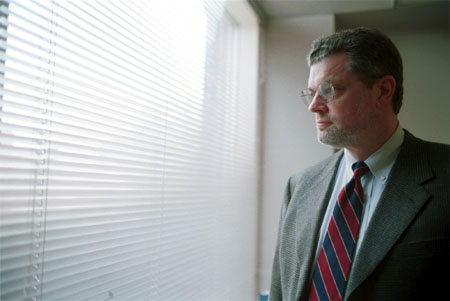Be hopeful, be wary, energy experts tell Mass.

It probably won’t, but it can happen here.
That was the message of a group of experts on the California energy crisis who convened for a panel discussion Tuesday at the John F. Kennedy School of Government’s Arco Forum.
Deregulated energy markets are working around the globe, panel members pointed out, so the California experience shouldn’t be viewed as evidence that deregulation doesn’t work. Still, lessons need to be learned from California, mainly, that government inattention and poorly designed deregulation can lead to disaster.
“It will happen [in Massachusetts], maybe not this year, maybe not next year, unless the lessons of California are heeded,” said Michael Shames, executive director and co-founder of the Utility Consumers’ Action Network, a San Diego-based consumer group.
The discussion was sponsored by the Center for Business and Government and moderated by Philip Sharp, a former 10-term congressman and former chairman of the U.S. House Energy and Power Subcommittee. Other panelists included Shames; William Hogan, research director for the Harvard Electricity Policy Group and Lucius Littauer Professor of Public Policy and Administration at the Kennedy School; Debra Bowen, a California state senator and chair of the state legislature’s Energy, Utilities and Communications Committee; and Rick Sergel, president and chief executive officer of National Grid USA, which supplies power to New England customers.
The roots of California’s problem were planted in 1995 when a plan to deregulate the market was made mainly with political concerns in mind, Hogan said.
Hogan said the California crisis was triggered by an unusual confluence of events, including a tight energy supply caused by the lack of construction of new power plants, an unexpected spike in the price of natural gas – used to generate much of California’s electricity – and the structure of the deregulated California energy system.
“I think the California problem is fundamentally a man-made problem, but that doesn’t mean it isn’t serious. It’s very serious,” Hogan said.
Bowen hinted that some market manipulation might be happening. She pointed out that some California energy companies have earned enormous profits, topping 1,000 percent in one case. In addition, she said, as the state has stepped in to buy power and supply it to consumers, some in-state generators have refused to sell at any price.
Bowen predicted a rough summer in California, when energy supply may not meet the demand caused by air conditioning needs. Though more power plants are under construction, significant new generation isn’t expected to be available until 2002 or 2003. By 2004, supply is again expected to exceed demand, she said.
In the meantime, Hogan said, consumer prices should be allowed to rise with the market. But Shames replied that that strategy is unrealistic. Passing costs directly to consumers, he said, would cause utility bills to triple, something consumers wouldn’t stand for.
“If you do that you’ll have a rebellion in California that will make the Boston Tea Party look like high tea,” Shames said. “There is no confidence by anyone in California that the prices charged are fair and just.”
Sergel said he wouldn’t rule out a California-type crisis ever hitting New England, but he thought there were several reasons it is unlikely here.
First, he said, New England has enough capacity to supply its needs, and much of the power generation happens within New England, reducing reliance on finding power outside the region. Second, he said, much of the power is purchased under long-term contracts that ensure price stability over time.
Third, he said, deregulation here happened after it did in California, so lessons were learned from California’s mistakes. In addition, he said, the 1965 blackout that struck New England resulted in a pool structure from which areas can draw power during localized shortages. And fourth, New England’s regulators have allowed power companies to pass along market increases in the price of power to consumers, ensuring healthier power companies.
“[Passing price increases to consumers] is not easy to do. It takes a great deal of political courage,” Sergel said.
Piecing the California energy market back together may be difficult, the panelists indicated, because power consumers are skeptical that the crisis hasn’t been manufactured as a way to increase rates and profits for energy companies.
While Hogan advocated quick federal approval of a sweeping rewrite of the state’s deregulation plan, Bowen said the state’s experiment with deregulation has made many consumers nostalgic for the days of regulated power.
“People would rather pay a little too much for an inefficient, public power authority than risk being gouged in order to get a 10 or 15 percent price savings some of the time,” Bowen said, adding a warning for Californians: “In the short term, get under your desk and duck; it’s going to be a really bad summer.”




